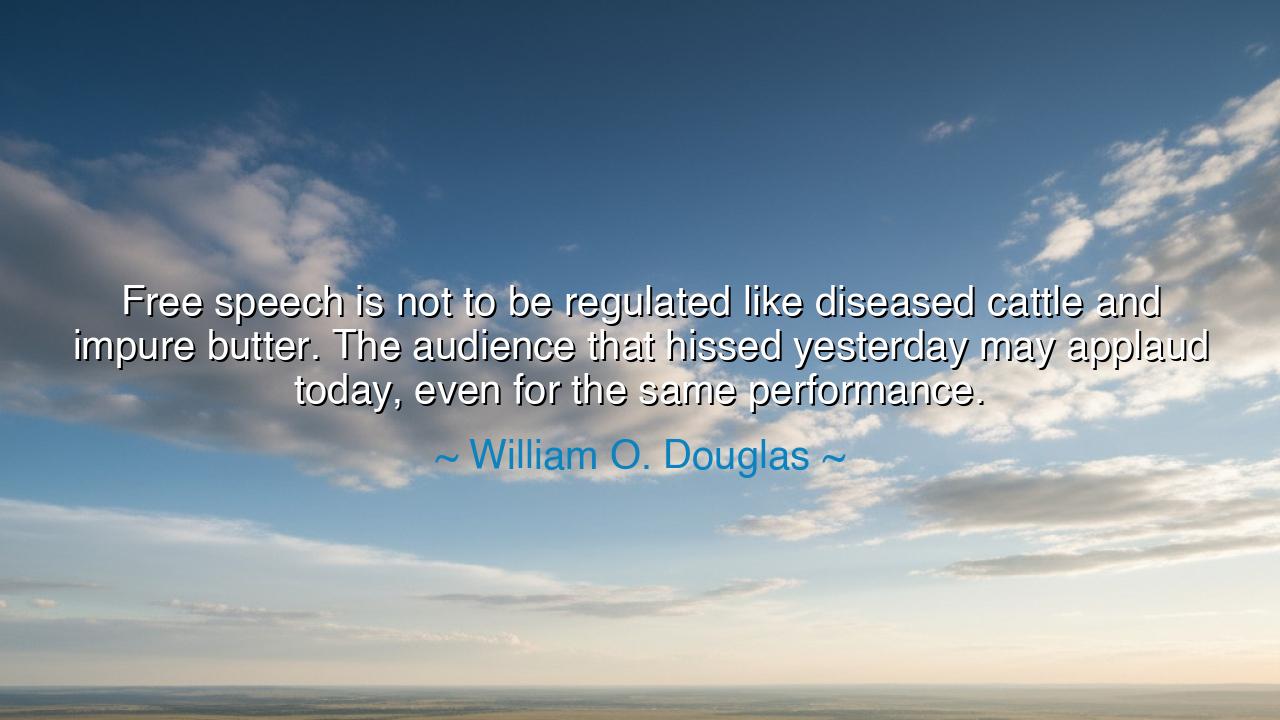
Free speech is not to be regulated like diseased cattle and
Free speech is not to be regulated like diseased cattle and impure butter. The audience that hissed yesterday may applaud today, even for the same performance.






The words of William O. Douglas, Justice of the Supreme Court and guardian of liberty, strike like a bell of warning: “Free speech is not to be regulated like diseased cattle and impure butter. The audience that hissed yesterday may applaud today, even for the same performance.” In these words he proclaims that free speech is not a commodity to be inspected, censored, or discarded according to the taste of the moment. It is the lifeblood of democracy, the sacred right of the people to speak, even when their words offend, disturb, or challenge the powerful.
The ancients understood this peril well. In the Agora of Athens, voices clashed with passion—some praised, others condemned. Yet it was precisely this storm of words that gave life to democracy. To silence one voice because it displeased was to endanger all voices, for who could decide which was pure and which was impure? Douglas’s image of cattle and butter is no accident—he warns us not to treat ideas as spoiled goods subject to regulation, for the thought despised today may be the wisdom embraced tomorrow.
Consider the story of Galileo Galilei, condemned by church authorities for proclaiming that the earth moves around the sun. His words were hissed in his time, declared dangerous, heretical, and impure. Yet centuries later, the same truth is celebrated as the foundation of modern science. What was once silenced has become the cornerstone of knowledge. Douglas reminds us that today’s unpopular voice may be tomorrow’s triumphant chorus.
His wisdom also unmasks the folly of censorship. To regulate speech by popularity is to place truth in chains, for truth often arrives first as scandal. The crowd is fickle—it may hiss today and applaud tomorrow, not because the performance has changed, but because the eyes of the people have. Thus, to allow the crowd, or the state, to decide what may be spoken is to surrender the very soul of liberty.
Let the generations remember: free speech is not safe, nor should it be. It is raw, untamed, often uncomfortable—but it is the furnace in which ideas are tested, refined, and revealed. Douglas speaks as a prophet of democracy when he declares that speech must not be treated as filth to be discarded, but as breath itself, given to all. For in the tumult of voices lies the hope of progress, and in the freedom to speak lies the strength of a people who refuse to be ruled by silence.






BBBong Bong
Douglas' statement about free speech and its regulation calls into question whether public opinion can or should be used to determine what is acceptable speech. Can we trust public sentiment to dictate the validity of speech, especially when it can change so dramatically over time? How can we ensure that freedom of expression remains protected, even when opinions about what is appropriate or valuable fluctuate so rapidly?
HCHoang Chau
This quote by William O. Douglas challenges the idea that free speech should be subject to harsh regulation or public consensus. The fact that something can be hissed at one moment and applauded the next suggests that public sentiment can be unpredictable and is often influenced by factors beyond the message itself. Does this mean that regulation of free speech is inherently flawed, given how quickly perceptions can change?
DTdh Th
Douglas’ perspective on free speech challenges the notion of censorship and regulation. He draws a compelling parallel between free speech and something that should not be regulated harshly, like diseased cattle. The idea that public opinion can change so drastically for the same idea or performance raises an interesting point: Should the government or society be regulating speech, or should individuals have the right to express themselves freely, even if it’s met with mixed reactions?
NTBao Nam Tran
William O. Douglas' quote reminds us that free speech is not something that can be controlled or confined to rigid, binary judgments. If a performance or an idea can evoke strong negative reactions one day and then be celebrated the next, isn’t that a sign of how subjective and fluid public opinion can be? Should we allow such fluctuations in reaction, or does this suggest that public judgment is often too fickle to regulate free speech fairly?